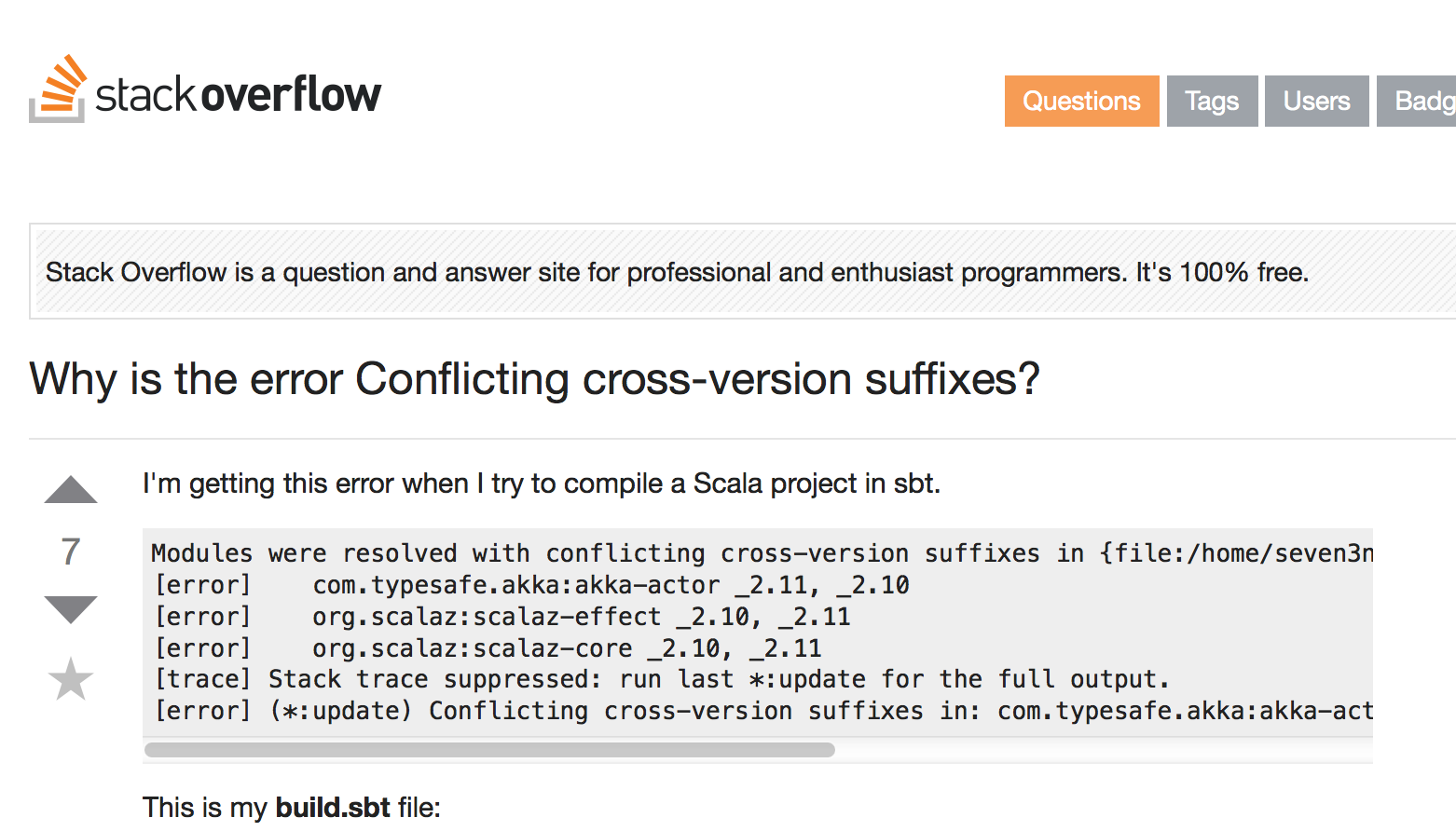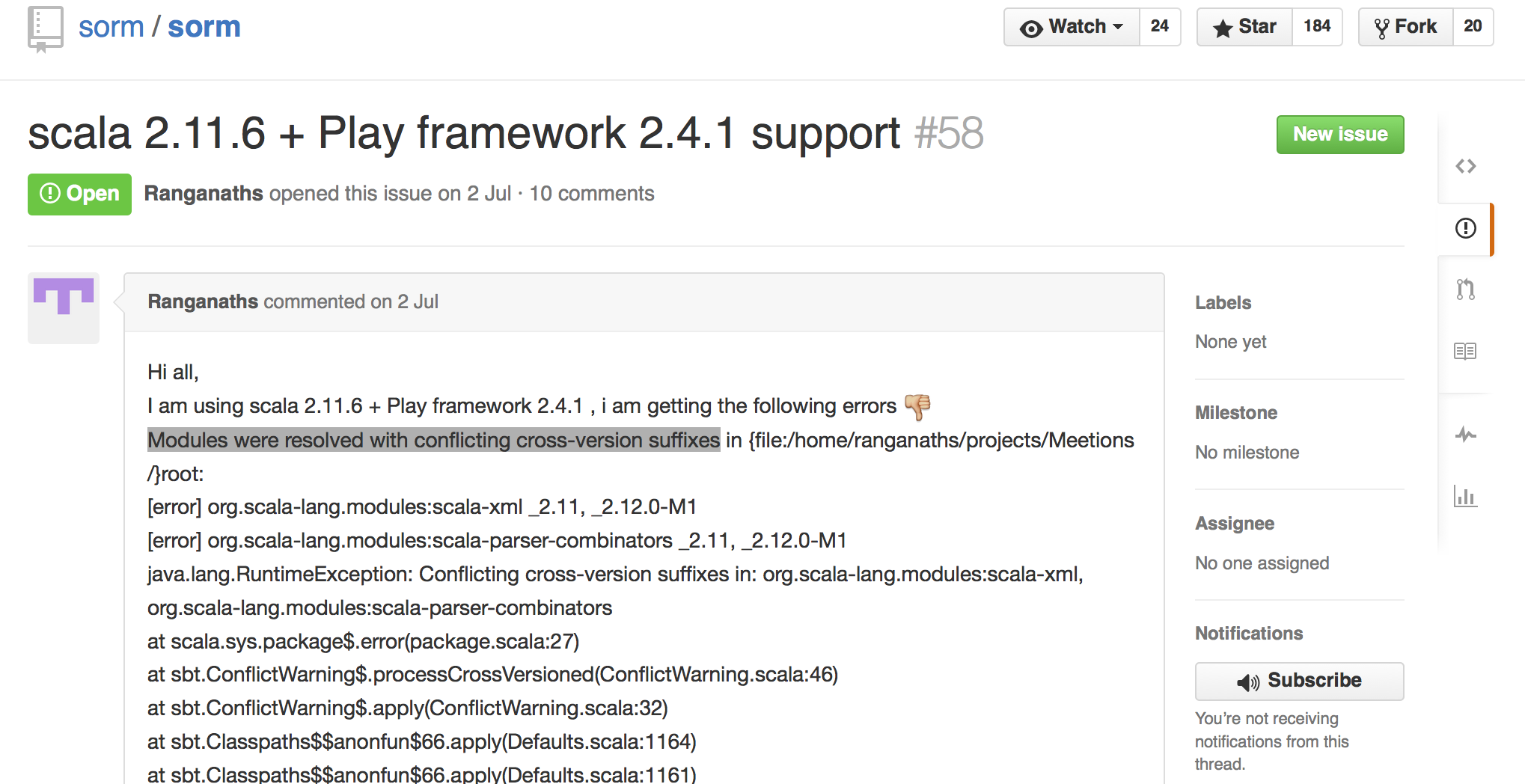Dotty: exploring the future of scala
Dmitry Petrashko

Video of this talk on Youtube:
https://youtu.be/aftdOFuVU1oFollow my slides
http://goo.gl/kVXZqu
Dotty?
- a new compiler for a Scala-like language
- developed at LAMP EPFL
- is currently not ready for production use
- some of the new technologies explored in this project will find their way into future versions of Scala
About me:
- https://github.com/darkdimius/
- doing PhD at EPFL
- previously worked on ScalaBlitz
- since March 2014 year working on Dotty.
Dotty contributor stats:
git ls-tree -r -z --name-only HEAD -- |egrep -z -Z -E '\.(scala)$'\
| xargs -0 -n1 git blame --line-porcelain |grep "^author "|sort|uniq -c|sort -nr
| author | commits | additions | deletions | blame lines |
| Martin Odersky | 2,280 | 146,133 | 85,391 | 57,284 |
| Dmitry Petrashko | 628 | 158,249 | 50,201 | 83,929 |
| Samuel Gruetter | 19 | 62,324 | 12,510 | 36,615 |
| Ondrej Lhotak | 29 | 2,009 | 340 | 1,874 |
| Guillaume Martres | 77 | 2,197 | 1,190 | 1,171 |
| Vera Salvisberg | 17 | 1,109 | 364 | 819 |
| Jason Zaugg | 16 | 213 | 149 | 153 |
| Alexander Myltsev | 5 | 275 | 65 | 144 |
| Vlad Ureche | 13 | 255 | 77 | 51 |
Talk Structure
- Part 1: What dotty is expected to bring to the table
- Language:
- Union(|) and Intersection(&) Types
- SIP-23: Literal-based Singleton Types
- SIP-24: Repeated By Name Parameters
- SIP-25: Trait Parameters
- SIP-20: Improved Lazy Vals Initialization
- Deprecations
- Ecosystem:
- Tasty
- scala.meta
- Linker
- Compilation speed
- Language:
Talk Structure
- Part 2: Internals
- Denotations
- Denotation Transformers
- Mini-phases
- Tree Checkers and postconditions
Intersection(&) types
similar to Scala2 with
def foo(arg: Serializable & Comparable): Unit
Intersection(&) types
similar to Scala2 with
trait A {
type T = Int
}
trait B {
type T = Double
}
(A with B) # T == Int
(A & B) # T == Int & Double
Intersection(&) types
what is the difference?
with is ordered, & is not
A with B is different from B with A. & is not
Union(|) types
Scala2 equivalent: none
class A(x: Int)
class B(x: Int)
class C(x: Array[Int])
object Test{
def foo(x: A | B): Int = x.x
def bar(x: A | C): Int | Array[Int] = x.x
}
Union(|) types: proper Enumerations
object DaysOfTheWeek{
object Mon
object Tue
object Wed
object Thu
object Fri
object Sat
object Sun
type Weekend = Sat.type | Sun.type
type Workweek = Mon.type | Tue.type | Wed.type | Thu.type | Fri.type
type All = Weekend | Workweek
}
SIP-23: Literal-based singleton types
object Literals{
val fortyTwo: 42 = 42
val `2`: 2 = 2
val fortyFour: 44 = fortyTwo + `2`
val text: "text" = "text"
def id[T](a: T) = a
val two: 2 = id(`2`)
}
SIP-24: Repeated By Name Parameters
=> T* means Function0[Seq[T]]
object DaysOfTheWeek{
def foo(a: => Any*) = ()
def bar(a: => Any*) = foo(a : _*)
def baz(a: => Seq[Any]) = foo(a : _*)
bar(???, ???)
baz(Seq(???, ???))
}
SIP-25: Trait parameters
trait A(val i: Int)
SIP-25: Trait parameters
trait A(val i: Int)
trait A1 extends A(1)
trait A2 extends A(2)
object O extends A1 with A2 {
// is i == 1 or i == 2
// how many times was it initialized?
}
SIP-25: Trait parameters: Details
trait A(val i: Int)
trait B extends A
class C extends B with A(1)
object O extends A(2) with B
SIP-20: Improved Lazy Val Initialization
object A {
lazy val a0 = B.b
lazy val a1 = 17
}
object B {
lazy val b = A.a1
}
SIP-20: Improved Lazy Val Initialization
object A {
lazy val a0 = B.b // <-- Thread 1
lazy val a1 = 17
}
object B {
lazy val b = A.a1 // <-- Thread 2
}
SIP-20: Improved Lazy Val Initialization
object A {
lazy val a0 = B.b // <-- Thread 1, grabs lock
lazy val a1 = 17
}
object B {
lazy val b = A.a1 // <-- Thread 2
}
SIP-20: Improved Lazy Val Initialization
object A {
lazy val a0 = B.b // <-- Thread 1, grabs lock
lazy val a1 = 17
}
object B {
lazy val b = A.a1 // <-- Thread 2, grabs lock
}
SIP-20: Improved Lazy Val Initialization
object A {
lazy val a0 = B.b // <-- Thread 1, grabs lock
lazy val a1 = 17 // Potential deadlock
}
object B {
lazy val b = A.a1 // <-- Thread 2, grabs lock
}
SIP-20: Improved Lazy Val Initialization
object C {
lazy val a0 = { /* long computation with IO */ } // <-- Thread 1
lazy val a1 = 42 // <-- Thread 2 will be waiting for Thread 1 to finish
}
SIP-20: Improved Lazy Val Initialization
Dotty lazy values:
- do not deadlock
- allow concurrent initialization of independent fields
- are thread unsafe by default
- are 40% faster to access by default
- need to use @volatile to request thead-safeness
- if @volatile is used, 5% faster than in scala2 (one non-volatile read vs volatile read)
Deprecations
object Test {
def foo() { // procedure syntax
}
}
Deprecations
object Test {
def foo(): Unit = { // procedure syntax
}
}
Deprecations: DelayedInit
/* Classes and objects (but note, not traits) inheriting the `DelayedInit`
* marker trait will have their initialization code rewritten as follows:
* `code` becomes `delayedInit(code)`
*/
Deprecations: DelayedInit
trait Helper extends DelayedInit {
def delayedInit(body: => Unit) = {
println("dummy text, printed before initialization of C")
body // evaluates the initialization code of C
}
}
class C extends Helper {
println("this is the initialization code of C")
}
new C
// dummy text, printed before initialization of C
// this is the initialization code of C
Deprecations: DelayedInit. Replacement: By-name args in traits
trait Helper(body: => Unit) {
println("dummy text, printed before initialization of C")
body // evaluates the initialization code of C
}
class C extends Helper(println("this is the initialization code of C"))
new C
// dummy text, printed before initialization of C
// this is the initialization code of C
Ecosystem
Ecosystem: Binary compatibility

Ecosystem: Binary compatibility

Ecosystem: Binary compatibility

Ecosystem: Binary compatibility

Ecosystem: Binary compatibility.
Library author perspective:
- should be carefull about what they depend on
- should publish multiple versions of same library
- compiled for multiple versions of scalac
Ecosystem: Binary compatibility.
Library user perspective:
- if a library that you depend on is legacy, you have a problem
- if a library that you depend on is experimental, you have a problem
Ecosystem: Binary compatibility.
Java8
Java 8 is coming
- provides new features. Will be used by scala 2.12 by default
- is incompatible with Java 7
- is incompatible with Android
Ecosystem: Binary compatibility.
JavaScript
Ecosystem: Binary compatibility.
Typelevel, Policy & other forks
Developing a library,
you need to consider publishing for
(2.10, 2.11, 2.12) x (java6, java8, JS) x (Typesafe, Typelevel)
Why???

This should not bother developers!!!
Ecosystem: TASTY
Proposed by scala.meta.
Interchange format that stores:
- Trees
- Types
- Positions
- Custom sections
Ecosystem: Tasty

Ecosystem: TASTY
- Allows to get scala source from compiled classfiles
- Is not vulnerable to changes in implicit resolution
- No need to push multiple artifacts to maven. Dotty can recompile from TASTY
Ecosystem: ScalaMeta
- Metaprogramming done right
Previous project: Scalablitz
- Tunes collection operations for your use-case
- Gets ridiculous speedups(40x, 120x) for simple code, eg Array[Int].reduce(_+_)
- Less garbage allocated
- Better memory locality & cpu throuput utilization
Ecosystem: Linker
Compilation speed
- Dotty has design decisions that allow to get substantial speedups
- MiniPhases and their fusion
- Info transformers
- We did not yet do any performance tuning, but
- Compiling Hello world takes 1.4 sec vs 1.6 sec by scalac
- Compiling Dotty itself takes 27 sec vs 42 sec by scalac
- Part 2: Internals
- Not a big cake
- Context instead of global mutable state
- Denotations
- Denotation Transformers
- Mini-phases
- Tree Checkers and postconditions
Not a big cake
Scalac is a big cake:
- everything depends on everything
- hard to detect what is used where
- namespace polution
- where should a method be
- hard to modularize functionality
Not a big cake
Dotty has several small cakes:
- Context
- Typer
- Pattern-matcher
- GenBCode
Scalac: global mutable state
Dotty: everyting needs a Context
def typed(tree: untpd.Tree, pt: Type = WildcardType)(implicit ctx: Context): Tree
Dotty: everyting needs a Context
def tryEither[T](op: Context => T)(fallBack: (Context) => T)(implicit ctx: Context) = {
val nestedCtx = ctx.fresh.setNewTyperState
val result = op(nestedCtx)
if (nestedCtx.reporter.hasErrors)
fallBack(ctx)
else {
nestedCtx.typerState.commit()
result
}
}
Symbols
They change meaning depending on phase of compilation:
- classes obtain and lose members
- methods and values change types
- methods, values and classes change location where they are(lambdalift)
Denotations
- Represent meaning of a symbol or type in particular period.
- Forms a circular linked list with future and previous meanings.
- Full versioning of all the info: type, name, flags
Denotations
class C {
def id[T](t: T) = t
}
Denotations

Denotations

Denotation Transformers
/** A transformer transforms denotations at a given phase */
trait DenotTransformer extends Phase {
/** The transformation method */
def transform(ref: SingleDenotation)(implicit ctx: Context): SingleDenotation
}
Macro Phases

Macro Phases

Macro Phases
- Every phase traverses a tree independently
- Reading cold data
- Creating new subtrees
- That live long and are promoted to OldGen of GC
Does LazyVals implement LazyVals?
Macro phases
phase name id description
---------- -- -----------
parser 1 parse source into ASTs, perform simple desugaring
namer 2 resolve names, attach symbols to named trees
packageobjects 3 load package objects
typer 4 the meat and potatoes: type the trees
patmat 5 translate match expressions
superaccessors 6 add super accessors in traits and nested classes
extmethods 7 add extension methods for inline classes
pickler 8 serialize symbol tables
refchecks 9 reference/override checking, translate nested objects
uncurry 10 uncurry, translate function values to anonymous classes
tailcalls 11 replace tail calls by jumps
specialize 12 @specialized-driven class and method specialization
explicitouter 13 this refs to outer pointers
erasure 14 erase types, add interfaces for traits
posterasure 15 clean up erased inline classes
lazyvals 16 allocate bitmaps, translate lazy vals into lazified defs
lambdalift 17 move nested functions to top level
constructors 18 move field definitions into constructors
flatten 19 eliminate inner classes
mixin 20 mixin composition
cleanup 21 platform-specific cleanups, generate reflective calls
delambdafy 22 remove lambdas
icode 23 generate portable intermediate code
jvm 24 generate JVM bytecode
terminal 25 the last phase during a compilation run
No, Mixin does.
If you want performance, you do not want many Macro phases
Why? Macro phases cost a lot
Half of phases do `something` additionally
Mini Phases

Mini Phases

Mini Phases

Mini Phases
- Phases share tree traversal
- Trees you are accessing are hot
- Trees die fast and do not get promoted to OldGen of GC
Tree checkers and postconitions
Under Y-check:all after each phase:
- retype all the trees
- check that types are correct
- check that owners are correct
- check that there are no double definitions
- check that companion links don't get broken
- ckeck that there are no invalid names(eg, constructors have name < init >)
- check all postconditions defined by previous phases
Tree checkers and postconitions
Examples of postconditions:
- Erasure: check that all trees are erazed
- ExpandPrivate: check that public members are not overriden by private ones
- Constructors: check that all statements are lifted from body of the class to constructor
Thank you.
See my other talks.
1
Dotty: exploring the future of scala
Dmitry Petrashko